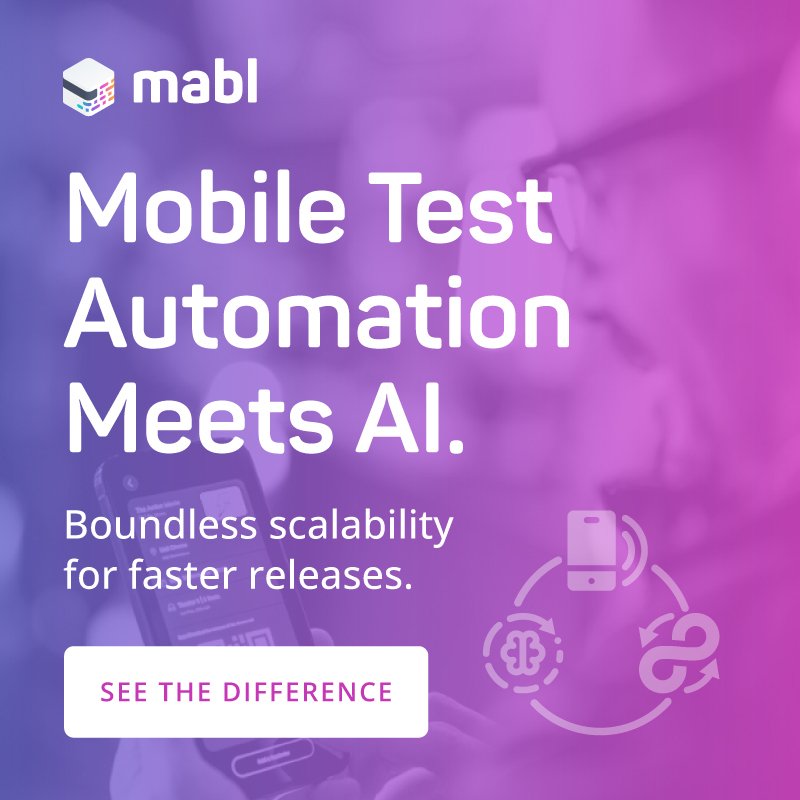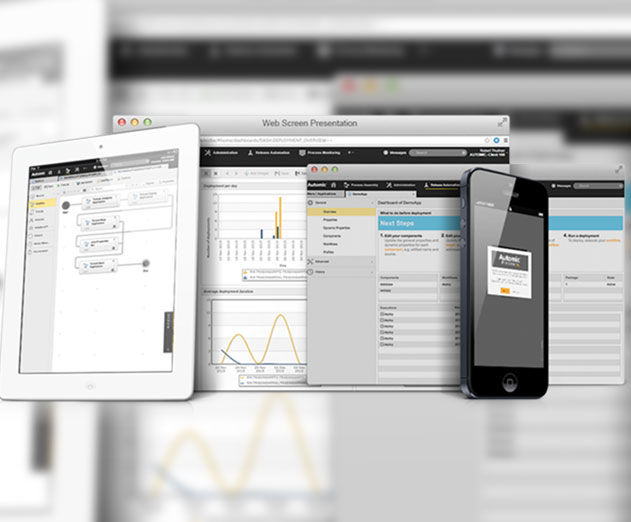Automic intelligent automation platform released
Friday, October 27, 2017

|
Richard Harris |
Automick, DevOps automation service acquired CA Technologies, releases their first platform release.
Automic, one of CA Enterprises most recent acquisitions, recently announced its first major product release under the CA name, and that Automic has been named the flagship piece of CA’s new Intelligent Automation platform. The move demonstrated CA’s investment in the automation market, a market said to have a potential to grow to $10B by 2020.
This is Automic’s first platform release since fall 2016, so the product enhancements and additions are significant, and tightly integrated with CA’s new Modern Software Factory, which enables enterprise-class DevOps and digital transformation initiatives.
We recently sat with Chris Boorman, CMO of Automic, to chat about the new release, and to get insight regarding digital transformation, continuous delivery, and other matters effecting the enterprise today.
Boorman: Automic has been apart of CA for nearly nine months. Version 12.1 is the first product launch since being acquired by CA Technologies. This product release emphasizes helping organizations move towards greater agility and faster application delivery. Version 12.1 is a significant step forward in advancing our automation capabilities beyond 'traditional' approaches towards more intelligent automation.
Boorman: Some of the most prominent obstacles to digital transformation are treating automation and DevOps as unrelated to it. Since nearly every business process touches IT and that the goal of digital transformation is to increase business agility, it follows that business agility is synonymous with IT agility. Automation can unify different departments, standardize practices and improve ITs responsiveness to business needs. Adopting and, perhaps most importantly, funding DevOps will dramatically improve the efficiency of both the development and operations departments in IT. Sadly most organizations demand DevOps without providing funding and upper management support.
Boorman: The big challenge right now is that development has embraced automation and agile practices - development is already agile. Operations may be the greatest benefactors of adopting varying types of automation. Development organizations are already agile and move faster than operations can keep up with.
Operations struggle to keep up with business demands as well. Automating any and every repetitive task is critical to allowing operations to become equal players in DevOps and become an empowering force for digital transformation. Password resets, test data/environment provisioning, initial troubleshooting, employee onboarding, financial close are just a small list of things that IT Ops get involved in, but are manual or semi-automated. The only way to address this is an automation platform that spans the silos, responds to triggerable events and auto-remediates ITSM records. CA Automic provides such a platform.
Boorman: Application releases that do not follow Continuous Delivery practices and methods are error-prone, slow and inconsistent from environment to environment. Following Continuous Delivery antipatterns in a hyper-competitive application economy can be lethal to business longevity, stunt revenue growth and undermine customer confidence.

Boorman: The key traits of an agile enterprise is an enterprise that almost immediately responds to competitive pressures and customer feedback and can adapt to new market conditions and opportunities with very short response times. An agile enterprise has a high trust and collaborative culture where all roles are understood in the context of end-result business outcomes. These enterprises are passionate about automation and strive to deliver everything continuously.
Boorman: DevOps is well known, but has not yet become a best practice across every enterprise - this will take time. The next step for DevOps is to become more sustainable at companies, where today it can fade away when change agents leave. DevOps will become less siloed and more standardized within businesses. Eventually, DevOps will be synonymous with IT.
Boorman: The world's largest privacy regulation, the EU's General Data Protection Regulation (GDPR) will become a reality in May 2018. EU companies and international businesses doing business with EU companies will not only have to protect individual's private data, but will also have to account for how and when individuals consent to have businesses store and use their personal data. The GDPR also addresses the location and exportation of this data. Gartner thinks that more than half of the companies affected by GDPR will be in compliance. There is a lot to complying with this new regulation, however, limiting data store access to automation mechanics reduces human error and increases auditability and security. Automation can reduce privilege creep and credential count. Automation can enable expiring JIT access privileges and ensure security patch and audit are performed as expeditiously as possible.
Boorman: What we mean by adding intelligence to the software development cycle to correlate data with events alongside automation. For example, the data collected from an APM tool can be associated with an app version and the specific set of features or trackers that made up that release. Automation mechanics empowered by heuristic algorithms and backed by a sophisticated event engine could prioritize the feature-set of your next release or even suggest a new feature. The future of the software factory will be that the "factory" itself will recommend improvements to be implemented into its pipelines.
Chris is responsible for Automic's worldwide marketing. Prior to joining Automic, he served as chief marketing officer for cloud collaboration vendor Huddle, and data integration leader Informatica. He has more than 20 years of experience leading international teams at enterprise companies including SDL, salesforce.com, VERITAS and Oracle.
This is Automic’s first platform release since fall 2016, so the product enhancements and additions are significant, and tightly integrated with CA’s new Modern Software Factory, which enables enterprise-class DevOps and digital transformation initiatives.
We recently sat with Chris Boorman, CMO of Automic, to chat about the new release, and to get insight regarding digital transformation, continuous delivery, and other matters effecting the enterprise today.
ADM: How long has Automic been a part of CA and what does today's news mean to both companies?
Boorman: Automic has been apart of CA for nearly nine months. Version 12.1 is the first product launch since being acquired by CA Technologies. This product release emphasizes helping organizations move towards greater agility and faster application delivery. Version 12.1 is a significant step forward in advancing our automation capabilities beyond 'traditional' approaches towards more intelligent automation.
ADM: What do you see as the biggest impediment to digital transformation, and what are organizations doing now to move past this challenge?
Boorman: Some of the most prominent obstacles to digital transformation are treating automation and DevOps as unrelated to it. Since nearly every business process touches IT and that the goal of digital transformation is to increase business agility, it follows that business agility is synonymous with IT agility. Automation can unify different departments, standardize practices and improve ITs responsiveness to business needs. Adopting and, perhaps most importantly, funding DevOps will dramatically improve the efficiency of both the development and operations departments in IT. Sadly most organizations demand DevOps without providing funding and upper management support.
ADM: What will be the next processes that you feel will benefit from automation both in development and in operations (one for each)?
Boorman: The big challenge right now is that development has embraced automation and agile practices - development is already agile. Operations may be the greatest benefactors of adopting varying types of automation. Development organizations are already agile and move faster than operations can keep up with.
Operations struggle to keep up with business demands as well. Automating any and every repetitive task is critical to allowing operations to become equal players in DevOps and become an empowering force for digital transformation. Password resets, test data/environment provisioning, initial troubleshooting, employee onboarding, financial close are just a small list of things that IT Ops get involved in, but are manual or semi-automated. The only way to address this is an automation platform that spans the silos, responds to triggerable events and auto-remediates ITSM records. CA Automic provides such a platform.
ADM: Why is continuous delivery so important?
Boorman: Application releases that do not follow Continuous Delivery practices and methods are error-prone, slow and inconsistent from environment to environment. Following Continuous Delivery antipatterns in a hyper-competitive application economy can be lethal to business longevity, stunt revenue growth and undermine customer confidence.

Chris Boorman, CMO,
Automic Software
Automic Software
ADM: You have mentioned an agile enterprise in the past. What are the key traits in an IT department that define a company that has become agile in this manner?
Boorman: The key traits of an agile enterprise is an enterprise that almost immediately responds to competitive pressures and customer feedback and can adapt to new market conditions and opportunities with very short response times. An agile enterprise has a high trust and collaborative culture where all roles are understood in the context of end-result business outcomes. These enterprises are passionate about automation and strive to deliver everything continuously.
ADM: Where do you see DevOps going next?
Boorman: DevOps is well known, but has not yet become a best practice across every enterprise - this will take time. The next step for DevOps is to become more sustainable at companies, where today it can fade away when change agents leave. DevOps will become less siloed and more standardized within businesses. Eventually, DevOps will be synonymous with IT.
ADM: Can you tell us about the new privacy laws coming in 2018?
Boorman: The world's largest privacy regulation, the EU's General Data Protection Regulation (GDPR) will become a reality in May 2018. EU companies and international businesses doing business with EU companies will not only have to protect individual's private data, but will also have to account for how and when individuals consent to have businesses store and use their personal data. The GDPR also addresses the location and exportation of this data. Gartner thinks that more than half of the companies affected by GDPR will be in compliance. There is a lot to complying with this new regulation, however, limiting data store access to automation mechanics reduces human error and increases auditability and security. Automation can reduce privilege creep and credential count. Automation can enable expiring JIT access privileges and ensure security patch and audit are performed as expeditiously as possible.
ADM: What does it mean to add intelligence into the software development cycle? Do certain processes add more intelligence than others, therefore are seen as being more important to modern software development?
Boorman: What we mean by adding intelligence to the software development cycle to correlate data with events alongside automation. For example, the data collected from an APM tool can be associated with an app version and the specific set of features or trackers that made up that release. Automation mechanics empowered by heuristic algorithms and backed by a sophisticated event engine could prioritize the feature-set of your next release or even suggest a new feature. The future of the software factory will be that the "factory" itself will recommend improvements to be implemented into its pipelines.
About Chris Boorman
Chris is responsible for Automic's worldwide marketing. Prior to joining Automic, he served as chief marketing officer for cloud collaboration vendor Huddle, and data integration leader Informatica. He has more than 20 years of experience leading international teams at enterprise companies including SDL, salesforce.com, VERITAS and Oracle.

Become a subscriber of App Developer Magazine for just $5.99 a month and take advantage of all these perks.
MEMBERS GET ACCESS TO
- - Exclusive content from leaders in the industry
- - Q&A articles from industry leaders
- - Tips and tricks from the most successful developers weekly
- - Monthly issues, including all 90+ back-issues since 2012
- - Event discounts and early-bird signups
- - Gain insight from top achievers in the app store
- - Learn what tools to use, what SDK's to use, and more
Subscribe here













